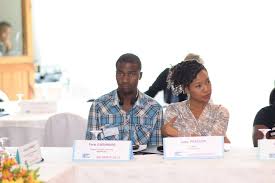By Byron Mutingwende
Harare-based journalist, Farai Gwenhure has produced a documentary that highlights the folly of child marriage, which is still rampant despite the fact that it has been outlawed in Zimbabwe.
On the 20th of January 2016 the Constitutional Court of Zimbabwe made a landmark ruling in which they struck off section 22(1) of the Marriages Act. The court in this judgment effectively declared marriages involving a child below the age of 18 a nullity.
The court found that section 22 of the marriages act which allowed marriages of girl children aged 16 was inconsistent with section 81 of the Constitution which defines a child as anyone below the age of 18.
Zimbabwe became one of the few countries to outlaw child marriages in a world where 25 000 children are getting married daily as per United Nations estimates.
“This is painful in the fact that the multi sector indicators report of 2014 produced by ZIMSTAT scientifically link child marriages to poverty. In Gokwe for instance where poverty is high the report highlights that by the time a girl reaches 19 years of age they would have procreated their second child. In the Bocha area the report directly links child marriages to poverty and polygamy suffice to say this is also linked to religious beliefs,” said Gwenhure ahead of the launch of his documentary at New Ambassador Hotel in Harare on Thursday 6 October 2016.
He said that the pains involved in a child marriage start with the physical excruciating pain of a child giving birth to another child followed by the issue of a child raising another child which is both sociological and economic.
“The result of the above is a regeneration of poverty cycles within a family.
The ruling deals a systematic blow to the above but only at a foundational level only good enough to shape the attitude for a new trajectory.”
However, despite the victory at the court, more work lies ahead in many respects including the legal part, the psychological, economic and sociological aspects related to child marriages.
“The law still needs to be expanded for the nation to benefit from the landmark ruling. Many pieces of legislation still need to be harmonised. These include the Child protection and Adoption Act, the Marriages Act, the African Marriages Act and the Criminal Codification and Reform Act that still deals with issues of consent.
The other issues that the law needs to address include the penalties involved in marrying a child or forcing a child into marriage. At the moment it remains silent and the value of the judgment remains low or even insignificant,” said Harare-based Lawyer, Danai Mabuto.
Mabuto added that the other gap relates to pregnancy resulting from consensual intercourse involving a child aged 16.
“The state needs to address what happens to the child born resultantly since the persons involved are automatically barred from marrying.”
Another prominent lawyer, Webster Jiti said that even when the above laws are harmonized, more needs to be done because the law will not be enough in dealing with the root cause of child marriages and also giving options to children in the Zimbabwean society.
“The civil society and faith groups particularly the church must play the educational role in terms of outlining the new reality especially to a society which holds the belief that girl children can be given in marriage to appease avenging spirits or for religious reasons like in the case of Johane Marange case,” Jityi said.
The facts on the ground are that there are communities still in need to be educated on the need to evolve our culture the same ways the laws and the global realties including the new challenges are evolving.
Finally the law and education needs to be complimented with a decisive strategy of poverty eradication especially on ensuring that the that disadvantaged children are assisted to ensure they continue going to school and guided to pursue a career path.
The documentary tells the stories of victims of child marriages and forced early marriages especially the pain they went through in bearing and raising children. It explores the psychology relating to watching their dreams going down the drain either due to personal mistakes in decision-making or by virtue of coercive circumstances.
The documentary further explores the options and interventions that need to be done by authorities in fighting the problem as an agent of regeneration of poverty cycles and a recipe for underdevelopment.
It deals with the in-depth aspects of the issues involved as opposed to the dry wooden approach which the mainstream media often takes, which as expected, will dry down once another matter of interest arises notwithstanding the fact that they would not have played the role of agenda setting until a holistic is found.
The documentary captures the voices of people who married as minors, legal experts, civic activists and the government officials response to provoke the interrogation of the matters at the core of child marriages thereby creating new energy into active interventions towards a holistic solution.
